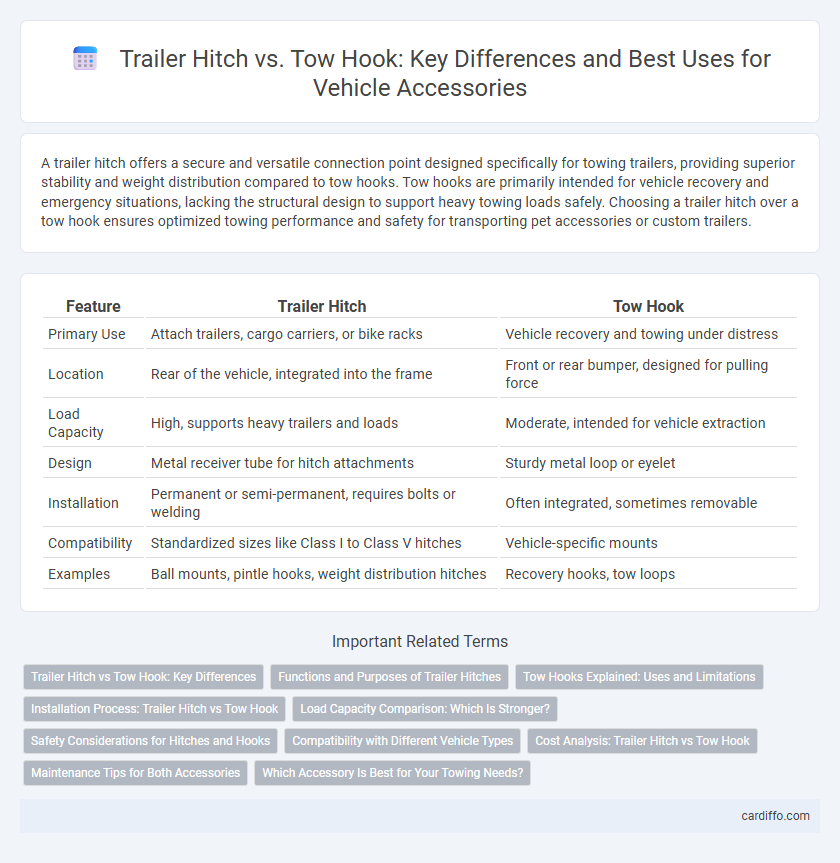A trailer hitch offers a secure and versatile connection point designed specifically for towing trailers, providing superior stability and weight distribution compared to tow hooks. Tow hooks are primarily intended for vehicle recovery and emergency situations, lacking the structural design to support heavy towing loads safely. Choosing a trailer hitch over a tow hook ensures optimized towing performance and safety for transporting pet accessories or custom trailers.
Table of Comparison
| Feature | Trailer Hitch | Tow Hook |
|---|---|---|
| Primary Use | Attach trailers, cargo carriers, or bike racks | Vehicle recovery and towing under distress |
| Location | Rear of the vehicle, integrated into the frame | Front or rear bumper, designed for pulling force |
| Load Capacity | High, supports heavy trailers and loads | Moderate, intended for vehicle extraction |
| Design | Metal receiver tube for hitch attachments | Sturdy metal loop or eyelet |
| Installation | Permanent or semi-permanent, requires bolts or welding | Often integrated, sometimes removable |
| Compatibility | Standardized sizes like Class I to Class V hitches | Vehicle-specific mounts |
| Examples | Ball mounts, pintle hooks, weight distribution hitches | Recovery hooks, tow loops |
Trailer Hitch vs Tow Hook: Key Differences
Trailer hitches are designed specifically for towing trailers and offer a secure attachment point on the vehicle's frame, supporting heavy loads with various classes that determine their weight capacity. Tow hooks are primarily built for vehicle recovery and emergency situations, providing a sturdy anchor point for pulling but not intended for towing trailers. The key difference lies in their purpose and load-bearing features, with trailer hitches enabling safe trailer transport and tow hooks facilitating vehicle extraction.
Functions and Purposes of Trailer Hitches
Trailer hitches provide a secure connection point on vehicles for towing trailers, boats, or campers, designed to handle heavy loads and ensure safe transport. They function by distributing towing weight evenly across the vehicle's frame, enhancing stability and control during transit. Unlike tow hooks, which are primarily attachment points for recovery or pulling, trailer hitches enable versatile towing applications and are essential accessories for hauling equipment and recreational vehicles.
Tow Hooks Explained: Uses and Limitations
Tow hooks provide secure attachment points on vehicles for pulling or recovery in off-road or emergency situations, designed to handle significant stress without damaging the vehicle frame. Unlike trailer hitches, which are optimized for towing trailers and carrying loads, tow hooks are primarily used for vehicle recovery, winching, or towing short distances. Their limitation lies in restricted load capacity and placement, making them unsuitable for sustained towing tasks or heavy trailers.
Installation Process: Trailer Hitch vs Tow Hook
The installation process of a trailer hitch typically requires professional tools and expertise due to its integration with the vehicle's frame and wiring for electrical connections. Tow hooks, on the other hand, generally offer simpler installation, often involving bolting onto pre-existing mounting points without the need for electrical components. Choosing between the two depends on the vehicle's design and intended use, with trailer hitches suited for towing trailers and tow hooks primarily for recovery purposes.
Load Capacity Comparison: Which Is Stronger?
Trailer hitches are engineered to handle significantly higher load capacities than tow hooks, with typical trailer hitches rated between 2,000 to 12,000 pounds or more, depending on class and build. Tow hooks generally have lower load limits, designed primarily for vehicle recovery and light pulling tasks, usually rated below 5,000 pounds. Choosing between a trailer hitch and a tow hook should involve assessing the intended load demands, as trailer hitches offer superior strength and stability for towing heavy trailers.
Safety Considerations for Hitches and Hooks
Trailer hitches provide a secure and stable connection for towing heavy loads, designed to distribute weight evenly and minimize sway, enhancing road safety. Tow hooks are primarily intended for vehicle recovery and emergency situations, not for towing, as improper use can lead to equipment failure or accidents. Ensuring the correct accessory is used according to manufacturer specifications and load ratings is critical for preventing accidents and maintaining safe towing and recovery operations.
Compatibility with Different Vehicle Types
Trailer hitches are engineered for compatibility with a wide range of vehicles, including trucks, SUVs, and some larger cars, providing secure towing capabilities for trailers and heavy loads. Tow hooks, commonly found on off-road vehicles and trucks, offer strong anchor points primarily for vehicle recovery rather than towing. Both accessories require proper mounting and compatibility checks based on vehicle weight ratings and intended use to ensure safety and effectiveness.
Cost Analysis: Trailer Hitch vs Tow Hook
Trailer hitches generally cost between $100 and $500 depending on vehicle compatibility and weight capacity, making them a mid-range option for towing accessories. Tow hooks are typically less expensive, averaging around $20 to $100, but they lack the versatility and structural integration of trailer hitches. Cost analysis favors tow hooks for budget-conscious users seeking simple recovery points, while trailer hitches offer greater value for frequent towing needs despite the higher initial investment.
Maintenance Tips for Both Accessories
Regular inspection for rust and secure attachment points is essential for maintaining trailer hitches and tow hooks. Applying rust-resistant coatings and lubricating moving parts prevents corrosion and ensures reliable performance. Proper storage when not in use extends the lifespan of both accessories by protecting them from environmental damage.
Which Accessory Is Best for Your Towing Needs?
A trailer hitch is ideal for securely attaching trailers and carrying heavy loads, offering greater stability and compatibility with various towing accessories like ball mounts and cargo carriers. Tow hooks, designed primarily for recovery and emergency situations, provide a strong anchor point to pull or tow vehicles but are not suited for regular towing tasks. Choosing the best accessory depends on whether you need reliable, everyday towing capability or occasional vehicle recovery support.
Trailer hitch vs Tow hook Infographic

 cardiffo.com
cardiffo.com